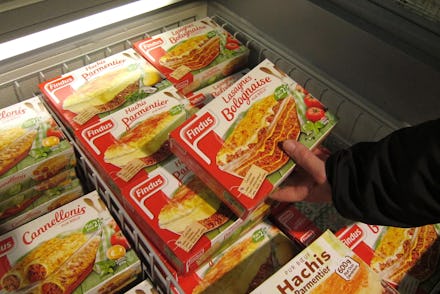Why Those Delicious Frozen Meals Are the Worst Thing You Could Possibly Be Eating

Frozen meals are probably the most convenient options for lunch and dinner for people that are always on-the-go. However, they might also be the most unhealthy option as well. Some frozen meals have high amounts of sodium, which in turn, can raise blood pressure.
"Many frozen meals contain between 700 to 1800 mg of sodium," according to Daily News and Analysis India. "With the daily recommended maximum dosage of 2300 mg of sodium, it is hard to stay in this limit! This puts people with high blood pressure at further risk."
In addition to high blood pressure, excessive salt intake can cause "higher risk of stroke, heart disease and kidney disease. Whenever you have a high blood pressure, it causes your heart to have to work a lot harder and it can cause damage to blood vessels and the heart muscle itself," Marisa Moore, a registered dietician, told Live Science.
Read more: How Do Frozen Vegetables Compare to Fresh When It Comes to Nutrients?
These "TV dinners" will never replace the traditional health benefits of cooking a meal with unprocessed ingredients, but there are healthier frozen meal options. "More people are demanding food that is both healthy and environmentally sound, and companies are responding," Libby Mills, spokesperson for the Academy of Nutrition and Dietetics, told Health.
According to WebMD, consumers should always read nutrition labels, and look for frozen meals that are loaded with vegetables, vitamins, minerals and fiber, but lower in calories.
While frozen meals are inexpensive, that doesn't mean they have to always be unhealthy. Be sure to be cautious about what you're eating. Not all frozen meals are created equal.
"Select a TV dinner that provides at least one serving of vegetables. It should also contain a source of lean protein, such as chicken breast or fish, and a whole grain, such as brown rice or whole-wheat pasta, or a starchy vegetable, such as sweet potato or acorn squash," according to Livestrong.